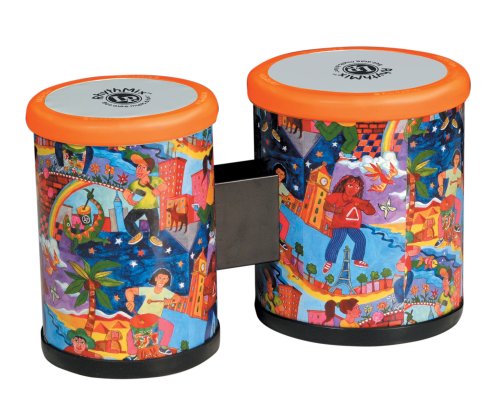 Our Rythmic Bongos are two-headed drums that produce hearty, authentic sound. They stand 6" tall, with 4" and 5" diameter sturdy synthetic heads - like two drums in one! Includes a musical activity booklet. Ages 2 and up.
Our Rythmic Bongos are two-headed drums that produce hearty, authentic sound. They stand 6" tall, with 4" and 5" diameter sturdy synthetic heads - like two drums in one! Includes a musical activity booklet. Ages 2 and up.Customer Review: Not easy to play with bare hands and too pricey*, but not all bad
Trying to play these myself, I have to play pretty forcefully to get a decent pitch. It's not nearly as easy to play as a better quality, non-toy version of bongos, but then, it's a whole lot sturdier than a quality wood & skin drum. The colors are vibrant and very appealing. These have withstood the abuses heaped on them by my kids from their toddler through preschooler years, and still look great. Buy a pair of mallets or drumsticks to go with these: it makes it a whole lot easier to play, and gives children more immediate gratification. *The "too pricey" comment was made when these were retailing at $35. The new list price of $20 seems much more reasonable, and a real bargain at the sale price of $13.99!
i.e. vs. e.g.
Use i.e. , to re-name, restate, or to clarify, as in, "He fell out of the window, i.e., down." This is an abbreviated Latin term (id est) that roughly translates as, "which is to say..." or "meaning..."
Use e.g., to provide examples, as in, "He liked falling from heights, e.g., out of windows, from airplanes, off of ladders." This is an abbreviated Latin term (exempli gratia) that translates as "For example..."
[And don't forget the comma after either one.]
Data is plural
Example: "The data are complete; we conclude that falling is dangerous." [We hear data used as a singular noun so often that the mistake seems right, but it isn't.]
Like vs. Such as
Use like to show similarities, as in, "He was falling like a rotten tomato that missed the stage."
Use such as to provide examples, as in, "Everything falls at times, such as tomatoes and bodies from windows." [Not: "Everything falls at times, like tomatoes and bodies from windows." Another correct way to say this is "Everything falls at times, e.g., tomatoes and bodies from windows."]
Everyone is singular
Example: "Everyone needs to jump out of his window." [Not: "Everyone needs to jump out of their window." You could use "his or her" to be politically correct.]
Comprise vs. Compose
Comprise means to gather multiple parts into a single whole. A good synonym is assemble. For example, "The band comprised [assembled] many different players." [Not: "The band was comprised of many different players."] Here, you have a whole and are describing its parts.
Compose means to make a whole by putting together multiple parts. A good synonym is create. For example, "The band was composed [created] of many different players." Here, you have the parts and are showing how they are put together to make a whole.
The difference is subtle, but what you need to consider is whether you are emphasizing the whole (the band) or the parts (the members of the band).
Staff is not a person
Use staff to refer to the entire group of employees and colleagues, and it is singular (the plural is staffs). A good synonym is team. For example: "The staff [team] is upset with the pay raise."
Use staff person or staff member to refer to an individual person on the staff. So, you would write, "Six staff members are not coming to work today." This refers to the individual people. If you want to refer to the entire staff at once, you would write, "The staff is not coming to work today."
David Bowman is the Owner and Chief Editor of Precise Edit, a comprehensive editing, proofreading, and document analysis service for authors, students, and businesses. Precise Edit also offers a variety of other services, such as translation, transcription, and website development. Click here for more information about Precise Edit's services.
latin music video
No comments:
Post a Comment